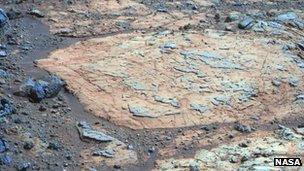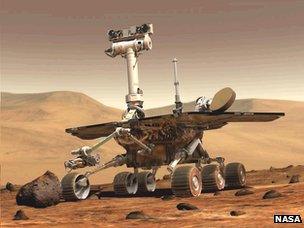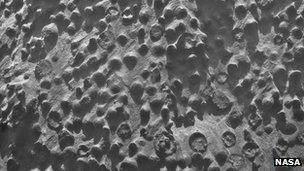Nasa's 'Oppy' rover could be rolling on Martian clays
- Published

The light-toned rocks may be clay-bearing
Nasa's Opportunity rover appears to have reached another milestone in its amazing nine-year mission on Mars.
Scientists report the robot has been trundling over what they believe to be clay-bearing rocks on the edge of a wide bowl known as Endeavour Crater.
Clays are water-altered minerals, but very different to the ones seen by the rover so far on its travels.
Those previous minerals were in contact with acidic water; clays are formed in the presence of neutral water.
"What drives us to investigate the problem of water on Mars is the fact that water is a necessary condition for life; but there's water and there's water," said Prof Steve Squyres, Opportunity's principal investigator from Cornell University in Ithaca, New York.
"We've been seeing sulphate minerals from day one with this rover. These sulphates form under very acid conditions. And even though water was present, if it's that acid it would be very challenging as a place for life to take hold.
"However, if it's not acid, if it's the kind of water you can drink, it's the kind of water that's going to be more suitable for life; and that's what the clays point to," he told BBC News.
Prof Steve Squyres: "We're going to do what we can while the vehicle is still operating"
Prof Squyres was speaking here this week at the American Geophysical Union (AGU) Fall Meeting, the largest annual gathering of Earth and planetary scientists.
He was updating the meeting on the most recent work of the robot which landed on Mars in 2004 to investigate its potential for microbial habitability in the past.
Since August 2011, it has been driving across the western rim of the 22km-wide Endeavour depression.
Opportunity is trying to understand the sequence of rocks at the crater which is likely to have been punched out of the ground by an asteroid more than three billion years ago.
As part of that study it has been surveying a mound the science team refers to as Matijevic Hill in honour of the late Jake Matijevic, a senior rover engineer.

The Opportunity and Spirit rovers were put on the Red Planet back in 2004
Two outcrops, within 100m of each other, have caught the attention.
The first, dubbed "Whitewater Lake", is the one that appears to be clay-bearing.
"The nature of the rocks that we have found, that we think are the ones that contain the clays, are very soft," explained Prof Squyres.
"They're light-toned; they're very fine-grained - so all the things that you would expect if clay minerals were present. They're layered and their composition is consistent with clay minerals being present."
The second outcrop is called "Kirkwood". This comprises small spheres caught in a matrix. At first, the team thought they had stumbled upon more of the famous haematite (an iron-rich mineral) "blueberries" seen earlier in Opportunity's mission. But Steve Squyres says these "newberries" seem to have a quite distinct composition.
The investigation of the two outcrops is still in its infancy. As well as using the rover's X-ray spectrometer on Whitewater Lake and Kirkwood to determine the chemical elements present, and thus get a better idea of their mineralogical composition, the team needs to work out the order and position of the rock layers to tell them something of their relative ages.

Newberries: The individual spherules pictured here are about 3mm in diameter
At the moment, it is not clear whether the two outcrops relate to a period from before or after the creation of Endeavour.
Opportunity continues to exceed all expectations. Its twin, Spirit, which was landed on the other side of Mars, succumbed to the dust and cold of the Red Planet in 2010. But "Oppy" keeps on rolling.
"We voided the warranty on this thing a very long time ago," Prof Squyres told the BBC.
"It was designed for 90 days; it's been almost nine years - this thing could drop dead tomorrow.
"I hope it lasts a long time but nothing's a given this late into the mission.
"We have the equipment that we need [to answer the questions we have about these rocks], I just hope we have the time that we need."
Jonathan.Amos-INTERNET@bbc.co.uk and follow me on Twitter: @BBCAmos, external
- Published4 December 2012
- Published4 December 2012
- Published8 December 2011